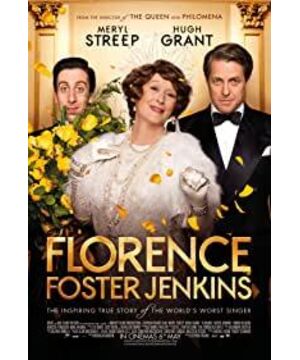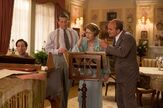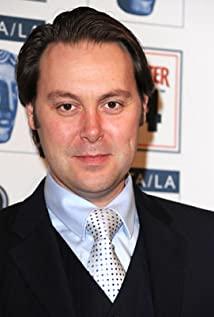In fondest endeavour/ I sing like a bird.
—Florence Foster Jenkins
before watching the movie, the introduction of the film in a few words has actually perfectly summarized the plot, but the film’s simple story is hidden The dramatic tension, the superb acting skills of the actors and the richness of the theme core made me unexpected. There are many comedy elements in the whole film. Every time Aunt Mei sings "forgetfulness", he boldly uses Howard in the Big Bang Theory to play the young pianist (the biggest highlight of the film), and all the "cooperating performances" and "co-stars" of all flattering and flattering people. Turn a blind eye", can trigger a series of laughter at the scene.
This huge "absurd" (absurd) contrast with reality, the tragedy in comedy, is the fascinating part of the film. When Aunt Mei pulled out the negative but truest New York Post comment from the trash can, the safety net that had been used for many years suddenly broke down and the sky turned around. The background was the gradually enlarged New York streets. Her figure was getting smaller and smaller, and the whole city seemed to be a huge one. The stage, like the phrase she asked Clair at the end of the film, "Were they all laughing at me?"
1. About ambition and secular success
What impressed me in the film was the conversation between Florence’s husband Clair and the young pianist Cosme about ambition. The experiences of these two men are actually similar. Clair used to be an actor, but he can only be a second-rate actor, and his marriage to Florence, who has a lot of money, allowed him to enjoy the upper-class art scene in New York. Cosme stood at the junction of talent and ambition. His pursuit of a serious pianist told him that he could not continue to accompany Florence's amateur performances. At the same time, the opportunity to perform at Carnegie Hall made him coveted. This seems like a shortcut. How many young pianists can play at Carnegie Hall? In a scene after the performance, it can be seen that Cosme has identified with Clair, from "We made it." to "Thanks for everything". It is indeed very easy for a person's ambition to be distorted, lost, and chasing fame and fortune in the world. It's just the absurdity in the movie that magnifies Cosme's inner compromise and struggle.
The end of the film shows that Cosme's piano career peak is also limited to the period of cooperation with Florence, the fitness career shown in the film actually blossomed, and Clair further contributed to the music career in New York. If the young Cosme insisted on taking the route of a serious pianist and playing steadily, would he become a famous pianist? Or is it like most people, buried from beginning to end? And second-rate actor Clair’s contribution to art, are these social activities also a blessing for the city of New York?
One of the core issues discussed in this film is the contradiction between ambition and talent. Can your talents match your ambitions? As far as Florence is concerned, her ambition is far greater than her talent. This is her sadness and pitifulness. She used to play the piano when she was a child, and later focused on singing due to illness. The scene where Florence and Cosme play Chopin's piano at Cosme's house in the film is moving. Although she only played a few notes, her deep love for music was vividly expressed. While Cosme's accompaniment made the piano music complete, it also helped Florence realize her dream. Therefore, the multiple levels of the film are reflected in the fact that Cosme and Clair were gradually moved by her during the process of getting along with Florence, and developed an understanding and tolerance for her.
2. Regarding personal dreams and external evaluations
Florence is very persistent in her dreams, and has been working hard to realize her musical dreams for decades. However, from a bystander's point of view, she can't sing with Ben, and is the "worst singer in history" at Carnegie Hall. The reporters of the New York Post were the embodiment of "truth" from beginning to end. When arguing with Clair, they mentioned Florence's huge "egotism" egotism, and Clair helped to increase the expansion and amplification of this egotism. It is true that Florence is self, and she is severely separated from the true evaluation of the outside world due to social class and self-blindness.
However, at the end of the film, the phrase Florence said when she only breathed,
"People may say I can't sing, but no one can ever say I didn't sing."
is the best interpretation of her own dream journey. , She loves music, and even fights diseases with the support of music. When she sang on the stage of Carnegie Hall, what she thought was beautiful music. For her, this was the moment when her dream came true. Maybe the dream should be ignored by others, and whether it is realized or not has nothing to do with the evaluation of the outside world.
3. Delusion & Lucidity Fantasy and Lucidity
Florence has been living in the huge illusion that she and Clair weave. The so-called "real music lovers" of her mini concerts are actually some deaf and blind elderly people, her Old friends, tacitly coaxing her to play. No one wants to pierce the truth. When they hear something ridiculous, they cheer loudly so that they can laugh openly.
Ironically, it was Florence's own act of kindness to pierce the window paper of illusion and sobriety. When she heard a soldier mentioned on the radio, she went to the door to deliver the album to others, and she also held a large-scale concert for the soldiers who served for the country. In the end, the paper couldn't contain the fire. The cuteness of Florence lies in her kindness and purity. She finally found a real scene in the trash can on the streets of New York, which can be called a classic.
What's interesting is that the various elements in the film express the motif and paradox of "fantasy" and "sober". For example, exaggerated costumes, exaggerated stage performances, gorgeous interior decoration, and repeated "wine" shots emphasize the "fantasy" ", and Florence's bald head and white-bottomed newspaper shots (real comments from the New York Post and Florence gravely ill) all express the theme of "reality."
4. Regarding the various forms of love. "Love has many forms." I
believe that everyone who watched the film will make a series of judgments on the Clair played by Hugh Grant, just like me. From the perfect husband at the beginning, to the night at his mistress’s house, the audience thought that Clair was just playing with Florence, and then for Florence, the conflict between him and his mistress Cathlyn in the bar, and the greatest protection of Florence from beginning to end, The safety net that I tried my best to build makes me in the final judgment that Clair loves Florence.
This kind of love transcends sex and is purely spiritual. The warmest thing about the movie is that Florence always asks Clair to recite poems and sentences to her before going to bed, "Please recite for me". Coupled with Hugh Grant's voice and English accent, it expresses endless tenderness and affection.
It is precisely because of loving her that she will help her build a big dream, set up the stage of life, and let her sing like a bird, carefree and enjoyable.
***Supplement: I have thought about the standard of artistic judgment after watching the film. Art is subjective and a game for the wealthy. Therefore, a small circle of upper-class society can often guide public opinion. It is also because of this that artists who were highly regarded in the era and regarded as over-reputed in the future were not at all in the era. Many artists are found to be highly evaluated by art history in the future. However, when discussing with friends, there is still a fixed standard for singing. Florence's singing in the movie is already completely amateurish. Therefore, even if the director and the screenwriter intend to perform, this layer is not the focus, or it is for the weakening of the dramatic effect. A little bit.
In short, the actors and actresses of this film are well-rounded, with multiple themes and deepness hidden in the absurdity. The director is very good at creating female characters. He has directed "Queen", so the film must be Chongao. Oscar has been very fond of biopics in recent years, and this film should have a good performance.
Recommend an evaluation article on Florence : https://psmag.com/the-worst-singer-in-the-world-6baec146710e#.pgvzlf1t7's evaluation of Florence:
“It's a bit like an amateur tightrope walker attempting the Niagara Falls crossing, over and over again, with every first step a spill. And yet, each time she beams, triumphant, insisting she's made it and in the finest style."
View more about Florence Foster Jenkins reviews











